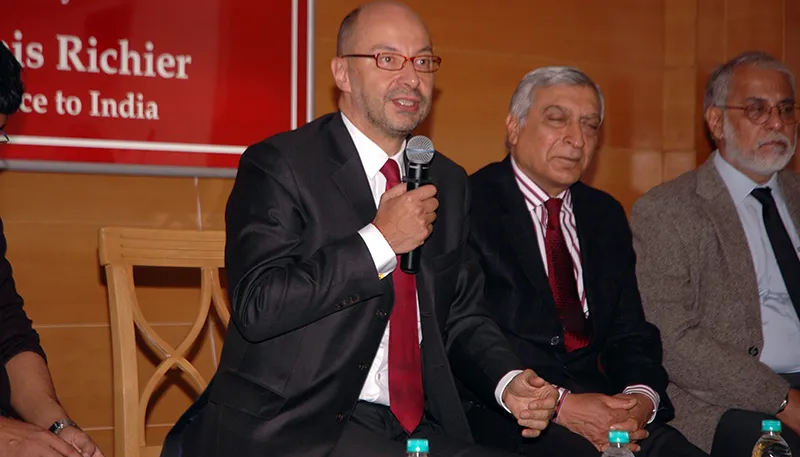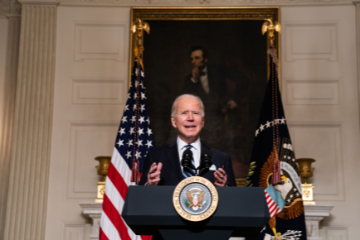The Ambassador of France to India, H.E. Mr. Francois Richier, has underlined the importance of a comprehensive agreement on migration and mobility, which would feed into increasing bilateral education and business opportunities.

As a pre-event of French President Francois Hollande’s upcoming visit to India, the Observer Research Foundation organised an interaction "What Makes Indo-French Relations Special: Understanding the Dynamics of the Strategic Partnership" on 11 February in New Delhi. The event primarily featured a presentation by France’s Ambassador to India, H.E. Mr. Francois Richier, and comments from Indian experts. ORF Director Mr. Sunjoy Joshi kicked off discussions by declaring that India-France is no fair-weather friendship but a ’special relationship’.
Mr. Kanwal Sibal, former Foreign Secretary and Indian Ambassador to France, introduced Ambassador Richier by way of noting the stable bilateral relationship between India and France. Specifically, Ambassador Sibal noted that France, in the minority among Western nations, reacted with ’great moderation’ to India’s 1998 Pokhran-II tests. Foreseeing India’s new role in the upper echelons of global power, France eschewed sanctions and instead opted to continue its strategic and comprehensive dialogue with India.
Ambassador Richier began by expressing excitement over President Hollande’s upcoming (14 February) visit to India. This will be President Hollande’s first official visit to Asia, highlighting India’s importance as both an emerging and global power. The Ambassador echoed Mr. Sibal’s comments by noting that since the 1990s longstanding Indo-French political ties have morphed into ’flourishing’ economic and strategic relations. Ambassador Richier commented that France was the first Western power to seek a strategic dialogue with India, one undiminished by the nuclear tests, and that the bilateral relationship has blossomed despite changes of government in both nations.
In describing the ’special’ nature of the India-France bilateral relationship, Ambassador Richier pointed to a common secular democratic nature and similar world outlook. Additionally, France has continuously supported India’s permanent membership on the UN Security Council and in the G20. Richier went on to note that Indo-French bilateral relations could be defined by the 3 S’s: sovereignty, stability, and synergy. He elaborated primarily on the synergies, the ’meat’ of this relationship.
In the defence realm, India first purchased French military aircraft in 1953. This trend has continued into recent times with the recent Rafale contract. The Ambassador hopes hardware purchases will continue with upcoming submarine and missile development bids. Also, French companies are contracted to build six ’European Pressure Reactors’ (ERPs), which will produce roughly 20% of Indian nuclear energy in 2030. Richier termed this a ’game changer’ for Indian energy. On counter-terrorism, bilateral relations are progressing well, as both nations have great incentives to halt the spread of Jihadist actors.
Additionally, the Ambassador touched upon a slew of important but lesser-discussed topics. First, he stressed a desire to promote closer Indo-French connections in research, innovation and industry. Also, Richier highlighted the tremendous growth in educational exchange between the two countries. In France, increasing numbers of English-language classes have resulted in a sharp uptick (roughly 3000-4000 per annum) in Indian students studying abroad. This number barely reached 100 per year in the late 1990s. Related, he underlined the importance of a comprehensive agreement on migration and mobility, which would feed into increasing bilateral education and business opportunities. Furthermore, because of knowledge gained during its own trials and tribulations, France is well-positioned to help India with its increasing need for urban development. Urbanisation will be a major issue for India, as economic growth increasingly shifts opportunity from the countryside to the cities.
Finally, the Ambassador spent a good deal of time analysing (non-defence) India-France economic relations, which are based primarily on investment as opposed to trade. Due to the recession and other factors, some observers may see bilateral economic relations as falling short of expectations. Economic interaction stands at roughly 8 billion Euros per annum, falling short of the 12 billion Euro objective. However, French companies employ over 250,000 skilled Indian labourers, bring in much-needed technology, and spur Indian R&D.
Of particular interest on this front was the Ambassador’s pushback against the typical narrative regarding lacking bilateral economic interaction. Ambassador Richier said significant French cross-border investment is funnelled to India through foreign branches of French multinational companies. If this investment were counted taking into account its ’territorial origin’, Indo-French economic interaction would stand near $17 billion per year, exceeding the aforementioned goals.
The response was given by Mail Today Opinion Editor Manoj Joshi and Hindu Delhi chief Pravin Swami. Mr. Joshi spotlighted ’deep, long-lasting’ Indian purchases of French military planes and helicopters. Additionally, he noted that cooperation with France was and continues to be instrumental to the development of India’s space program, an often overlooked aspect of the bilateral relationship.
Mr. Swami primarily focused on cooperation over the Middle East and Africa. He said that with America’s increasing disengagement from the Middle East, the foundations of India’s policy toward the region will further erode. Given India and Europe’s continued dependence on Middle-East and West and North African energy resources, these countries will need to work together on stability arrangements and military commitments in these regions. The importance of this comment was recently highlighted with France’s military involvement against Islamists in Mali. Increasingly accessible North American energy sources fuelling the US will necessarily drive India and France closer together on issues of energy security and counter-terrorism.
Overall, both the French Ambassador and Indian experts seemed sanguine regarding the India-France ’special relationship’. There is room and desire for a deepening of relations in important sectors-such as defence, energy, nuclear technology, investment and education/cultural connections. Additionally, the nations have a long track record of positive and mutually beneficial interactions to look back on, interactions that will only deepen moving forward.
Click here for Speech Video H.E. Mr. Francois Richier, Ambassador of France to India
(This report is prepared by Daniel Rubin, Henry Luce Fellow, Observer Research Foundation, New Delhi)
The views expressed above belong to the author(s). ORF research and analyses now available on Telegram! Click here to access our curated content — blogs, longforms and interviews.




 PREV
PREV

